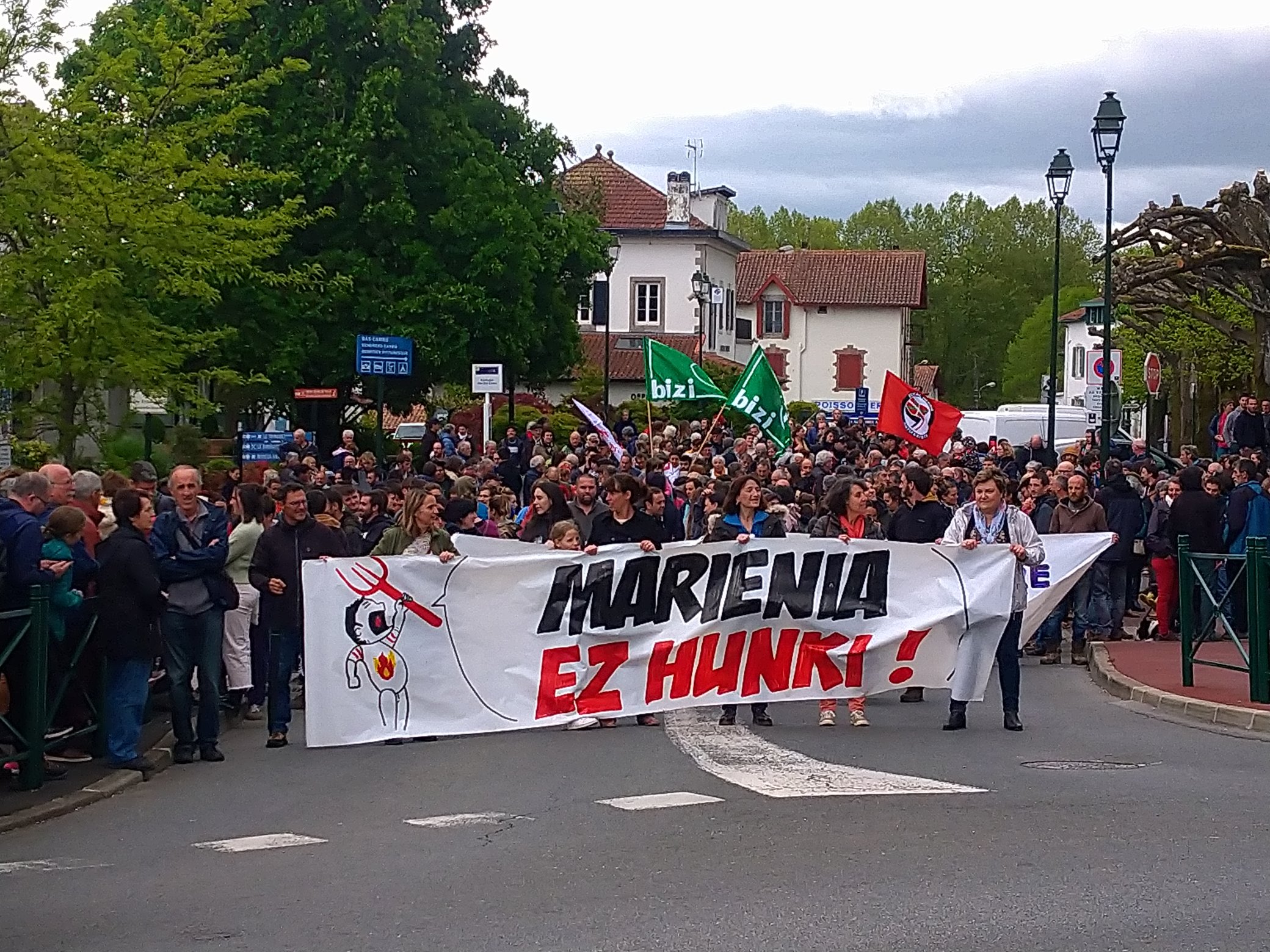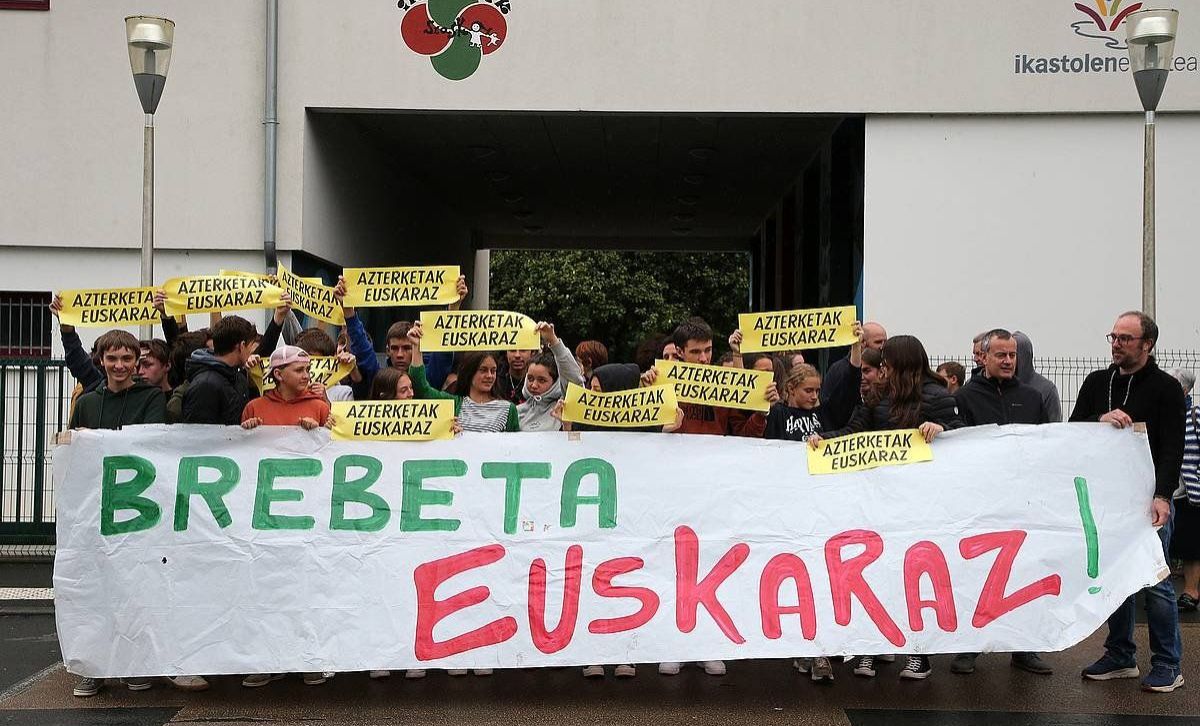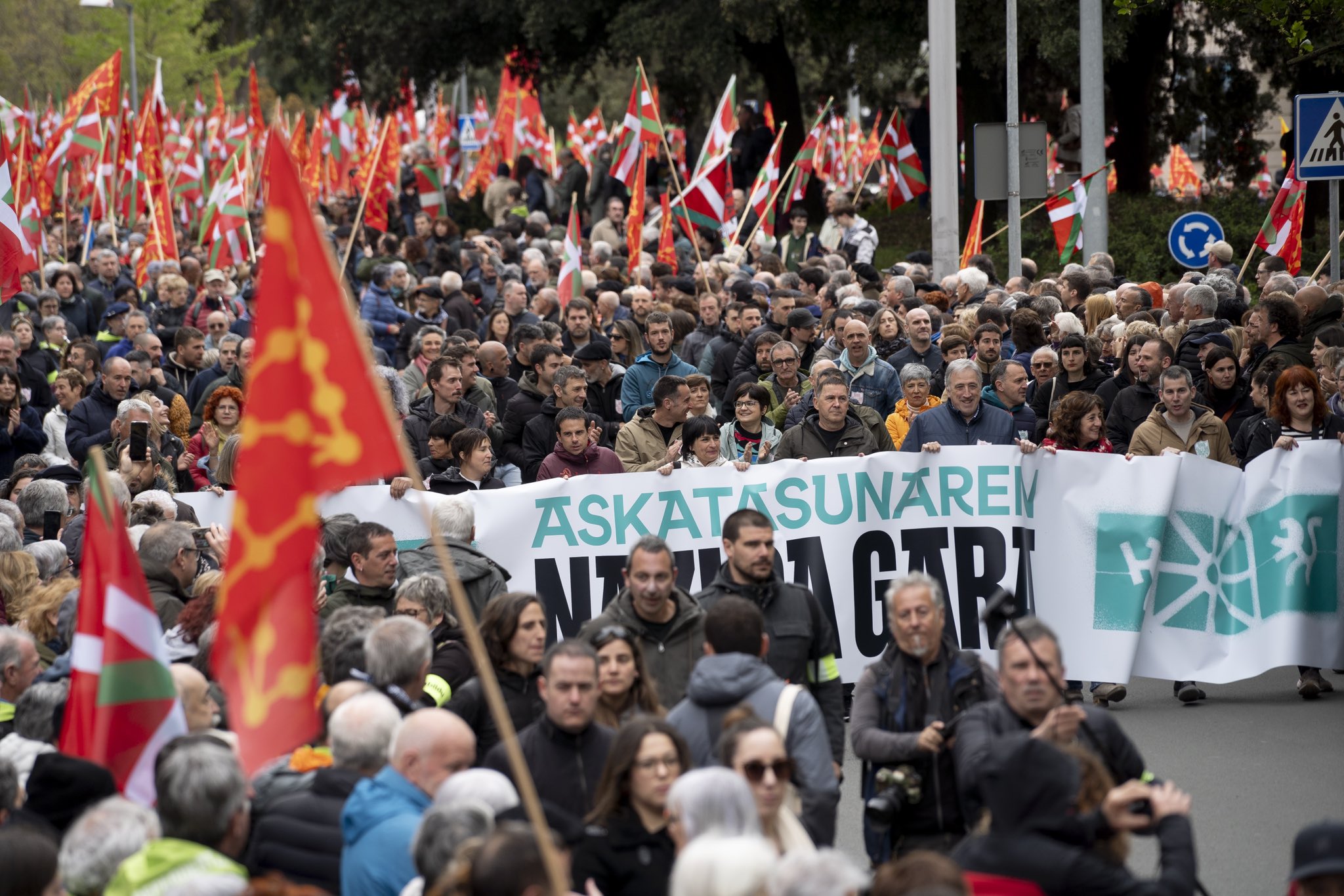Society
Environment
Politics
Economy
Culture
Basque language
Feminism
Education
International
Opinion
tuesday 22 april 2025
Automatically translated from Basque, translation may contain errors. More information here. 
More anti-social reforms in autumn
- The time has come for reforms that will affect retirement and public health, as well as IRPF and unemployment benefits. One more stone, the labour reform imposed by the financial markets to reduce the public deficit, the fall in the salaries of civil servants, the increase in VAT or the freezing of pensions.

Argia
The adjustments to the crisis launched a few months ago by the “financial markets”, the International Monetary Fund and the World Bank, ostensibly to reduce the public deficit, have only begun. The labour reform, the reduction of public employees’ wages, the increase in VAT, the freezing of pensions, which will begin next year, and the suspension of certain public investments have already been implemented. However, all this is not enough for the financial “wolves” and they are demanding more adjustment measures to be able to receive debt compensation with interest. That is why, as always, it is time to take more measures that will affect the most vulnerable. From now on and throughout the autumn, we will be fully involved in the reform of retirement, and it is also possible to initiate reforms that would affect the public health sector, which could be subject to co-payment, IRPF and unemployment benefits.
To denounce these “adjustments” and reforms, mobilizations and two general strikes have been carried out in the Basque Country, one in the French State that affected the citizens of the North on June 24, and the other on June 29 in the Southern Basque Country, convened by the patriotic trade union majority and the CCOO. On September 29, another general strike has been called by the CCOO and UGT in the Spanish state.
One of the main and most serious reforms to be approved is the one that is already being negotiated in the so-called Treaty of Toledo, made up of the government, political parties, bosses and trade unions: the question of retirement. So far, the official retirement age has been 65 years, although the real average for the Spanish state is 62 years, since there have been many early retirement processes since 52 years, especially in public companies and banking. In order to be able to retire and receive a minimum pension, a minimum contribution of 15 years was required. Now, according to the reform that is being discussed in Toledo, the workers want to retire at the age of 67, that is, to continue working for another two years. They also want to increase the number of years they have to work in order to retire and receive a minimum pension from 15 to 20.
Among the measures that are being considered to reduce the deficit after 2011 and that can be taken into account in the budgets to be adopted at the end of September is the reduction of unemployment benefits. In 2010, the Spanish Government spent €30,612 million on unemployment benefits, nearly two-thirds of the expenditure it is expected to achieve by 2012 - €50 billion.
All indications are that the amount of the prizes will be reduced. Currently, the unemployed received 70% of the regulatory base during the first 180 days of the benefit and 60% from day 181 until the end of the benefit period. The intention of the Spanish Government is to reduce the amount from 70% to 60% in the first six months and to receive 50% of the unemployed from there. The maximum and minimum limits of the prize would remain the same: from 492 euros per month to 1,076.44 euros, as long as the unemployed person does not have children in his care.
It was also planned to abolish the aid of EUR 430 which was granted to unemployed persons who were left unprotected at the end of their 18-month regular benefit. This aid, which was introduced 12 months ago, has cost around EUR 600 million. However, this measure seems to raise doubts in the Government. For this reason, Labor Minister Corbacho, on June 28, said that the government “will strive to maintain above all others the support of 430 euros that is given to the unprotected unemployed.” In the end, the Spanish executive has decided to maintain this support.
The public deficit and, above all, the threats of the “financial markets” overwhelm the government and, therefore, the government is looking for where to put the scissors. Therefore, the public health sector has begun to talk about and analyze the possibility of “adjustment”. The possibility of co-paying for medicines has already been put on the table, as well as the possibility of starting to pay for the service, despite its scarcity – the payment of one euro of a visit to the family doctor has been
mentioned. It is also assumed that the NAF will also be adjusted. In this regard, the Secretary of State for Finance, Carlos Ocaña, said on June 28: “The Spanish government is considering a small, modest and very limited adjustment of the IRPF” for next year... Therefore, if they are considering it, this adjustment will also be carried out.
To denounce these “adjustments” and reforms, mobilizations and two general strikes have been carried out in the Basque Country, one in the French State that affected the citizens of the North on June 24, and the other on June 29 in the Southern Basque Country, convened by the patriotic trade union majority and the CCOO. On September 29, another general strike has been called by the CCOO and UGT in the Spanish state.
Retirement at age 67 and higher contribution
One of the main and most serious reforms to be approved is the one that is already being negotiated in the so-called Treaty of Toledo, made up of the government, political parties, bosses and trade unions: the question of retirement. So far, the official retirement age has been 65 years, although the real average for the Spanish state is 62 years, since there have been many early retirement processes since 52 years, especially in public companies and banking. In order to be able to retire and receive a minimum pension, a minimum contribution of 15 years was required. Now, according to the reform that is being discussed in Toledo, the workers want to retire at the age of 67, that is, to continue working for another two years. They also want to increase the number of years they have to work in order to retire and receive a minimum pension from 15 to 20.
Reduce unemployment benefits
Among the measures that are being considered to reduce the deficit after 2011 and that can be taken into account in the budgets to be adopted at the end of September is the reduction of unemployment benefits. In 2010, the Spanish Government spent €30,612 million on unemployment benefits, nearly two-thirds of the expenditure it is expected to achieve by 2012 - €50 billion.
All indications are that the amount of the prizes will be reduced. Currently, the unemployed received 70% of the regulatory base during the first 180 days of the benefit and 60% from day 181 until the end of the benefit period. The intention of the Spanish Government is to reduce the amount from 70% to 60% in the first six months and to receive 50% of the unemployed from there. The maximum and minimum limits of the prize would remain the same: from 492 euros per month to 1,076.44 euros, as long as the unemployed person does not have children in his care.
It was also planned to abolish the aid of EUR 430 which was granted to unemployed persons who were left unprotected at the end of their 18-month regular benefit. This aid, which was introduced 12 months ago, has cost around EUR 600 million. However, this measure seems to raise doubts in the Government. For this reason, Labor Minister Corbacho, on June 28, said that the government “will strive to maintain above all others the support of 430 euros that is given to the unprotected unemployed.” In the end, the Spanish executive has decided to maintain this support.
Health and IRPF
The public deficit and, above all, the threats of the “financial markets” overwhelm the government and, therefore, the government is looking for where to put the scissors. Therefore, the public health sector has begun to talk about and analyze the possibility of “adjustment”. The possibility of co-paying for medicines has already been put on the table, as well as the possibility of starting to pay for the service, despite its scarcity – the payment of one euro of a visit to the family doctor has been
mentioned. It is also assumed that the NAF will also be adjusted. In this regard, the Secretary of State for Finance, Carlos Ocaña, said on June 28: “The Spanish government is considering a small, modest and very limited adjustment of the IRPF” for next year... Therefore, if they are considering it, this adjustment will also be carried out.
Mobilizazioak Ipar Euskal Herrian
Frantziako Estatuan krisialdi sozial ekonomiko eta finantzarioa ez da Espainiako Estatuan bezain larria. Dena den, defizit publikoaren murrizketak doikuntzak eragin ditu, Europako gainerako herrialdeetan bezalaxe. Aurten sektoreko lau greba orokor eta mobilizazio asko jasan behar izan baditu ere, Frantziako Gobernuak erretiroa eta pentsioak erreformatzeko asmoarekin aurrera egitea erabaki du. Halaber, beste neurri fiskal batzuk ezartzea aurreikusten du, Frantziako Gobernuaren erreformak Espainiako Gobernuarenak baino apalagoak izan arren. Erretiroei dagokienez, Frantziako Estatuan orain arte erretiroa hartzeko adina 60 urtetan zegoen. Erreformaren bidez, erretiroa hartzea bi urtez luzatu nahi dute, 62 urtera arte. Horrez gain, pentsioa jasotzeko urte gehiago kotizatzea eskatu nahi dute.
Frantziako Gobernuaren erabakiek berehala jaso dute sindikatuen erantzuna: milioika langile eta pentsiodun mobilizatu dituzte. Frantziako Gobernuaren administraziopean dagoen Ipar Euskal Herria ere eraso neoliberalari erantzuten ari da. Azken mobilizazioa ekainaren 24an burutu zen eta 10.000 pertsonako manifestazio arrakastatsua egin zen Baionan. Hil honetan eta hurrengoetan mobilizazio gehiago izango dira Iparraldean ere. Frantziako Estatu osoan greba orokor gehiago deitzea ez dute baztertu eta, orain artekoek bezala, ziur Iparraldean jarraipen handia izango dutela.
Frantziako Gobernuaren erabakiek berehala jaso dute sindikatuen erantzuna: milioika langile eta pentsiodun mobilizatu dituzte. Frantziako Gobernuaren administraziopean dagoen Ipar Euskal Herria ere eraso neoliberalari erantzuten ari da. Azken mobilizazioa ekainaren 24an burutu zen eta 10.000 pertsonako manifestazio arrakastatsua egin zen Baionan. Hil honetan eta hurrengoetan mobilizazio gehiago izango dira Iparraldean ere. Frantziako Estatu osoan greba orokor gehiago deitzea ez dute baztertu eta, orain artekoek bezala, ziur Iparraldean jarraipen handia izango dutela.
Most read
Using Matomo
#1
Gorka Peñagarikano Goikoetxea
#2
#3
Paul Beitia Ariznabarreta
#5
Mikel Garcia Idiakez
Newest
2025-04-22
Eneko Imaz Galparsoro
The Provincial Council of Bizkaia opposes the Argalario wind farm for the "critical" damage it would cause to the environment
The Natural Heritage Service has submitted a report against the Iparaixe II project, which aims to install five windmills on this mountain in Barakaldo. The Barakaldo City Council rejected the project a year and a half ago thanks to the pressure of the No–Barakaldo Wind Farm... [+]
2025-04-22
Unai Lomana Uribezubia
The fair season: six cultural activities at the gates of the 6th fair of Ciboure
As of April 30, the first princes of the Feria will be spotted in some corners of the Basque Country. Uxue Alberdi will be presenting the book Hetero, Maialen Lujanbio will offer a recipe and Maddi Sarasua will make a musical presentation of his book with family and friends,... [+]
2025-04-22
Eneko Imaz Galparsoro
Ernai expresses his intention to undertake "a new national impulse" at the Youth Meeting held in Berriozar
Ernai said he had gathered more than 3,000 people at the meeting between Thursday and Sunday. The main political event of the conference took place on Saturday evening, with the intervention of the spokesman of the youth organization, Amaiur Egurrola. The meeting point ended in... [+]
2025-04-22
Unai Lomana Uribezubia
A popular vegetable plantation is organized to protect farmland in Mariena
The ELB, Lurzaindia and Ostia extend their call for the protection of the lands of Cambo (Lapurdi). On the 17th of May, a walk, an event and a popular plantation are organized."The present and future of the territory depends on our involvement," they say.
2025-04-22
Gedar
Global military spending has tripled since the Cold War
Several studies show that increased military investment leads to the destruction of sectors such as health or education in some countries.
2025-04-22
Aiaraldea
The Basque Language Council of Aiaraldea will take new steps to reach the Basque festivities
The Basque Festival of Gora Aiaraldea has once again set in motion the dynamic of the Basque Council of Aiaraldea, in collaboration with Municipalities and associations. Its purpose is to promote the presence and use of the Basque language in the context of the festivities. This... [+]
2025-04-22
Euskal Irratiak
Brebetaren zientzietako froga euskaraz egiten ahalko da, sare pribatu zein publikoan
Antton Kurutxarri, Euskararen Erakunde Publikoko presidente ordearen hitzetan, Jean Marc Huart Bordeleko Akademiako errektore berriak euskararen gaia "ondo menderatzen du"
2025-04-22
Gorka Peñagarikano Goikoetxea
The funeral of Pope Francis will take place on Saturday and the conclave to select a new one in May
Pope Francis died at the age of 88 on Monday morning of a stroke. He's had health problems lately. He recommended the book Miñán publicly because it tells the situation of migrants.
2025-04-22
ARGIA
Israel’s Investigation of 15 Humanitarian Workers Is Rife with Lies
Fifteen humanitarian workers were killed by the Israeli army on 23 March on the grounds that they were terrorists and had not been identified. After a video refutes this version, the Israel Defense Forces has issued an internal report of what happened, but what is said in it is... [+]
2025-04-22
Eneko Imaz Galparsoro
The Basque Country as a nation is proclaimed by many actors on Patriotic Day
A number of political parties and actors have raised their voices on this year’s Patriot Day. As in recent years, the streets of Bilbao and Pamplona have been occupied by EAJ and EH Bila, respectively. Bagira, the Patriotic Movement of the Northern Basque Country, calls for... [+]
2025-04-17
Aitor Montes Lasarte
Berwick and us
You may not know who Donald Berwick is, or why I mention him in the title of the article. The same is true, it is evident, for most of those who are participating in the current Health Pact. They don’t know what Berwick’s Triple Objective is, much less the Quadruple... [+]
2025-04-16
Iñaki Etaio Alonso
Public services: paving the way for the chainsaw or clearing the forest?
The article La motosierra puede ser tentadora, written in recent days by the lawyer Larraitz Ugarte, has played an important role in a wide sector. It puts on the table some common situations within the public administration, including inefficiency, lack of responsibility and... [+]
Eguneraketa berriak daude




















